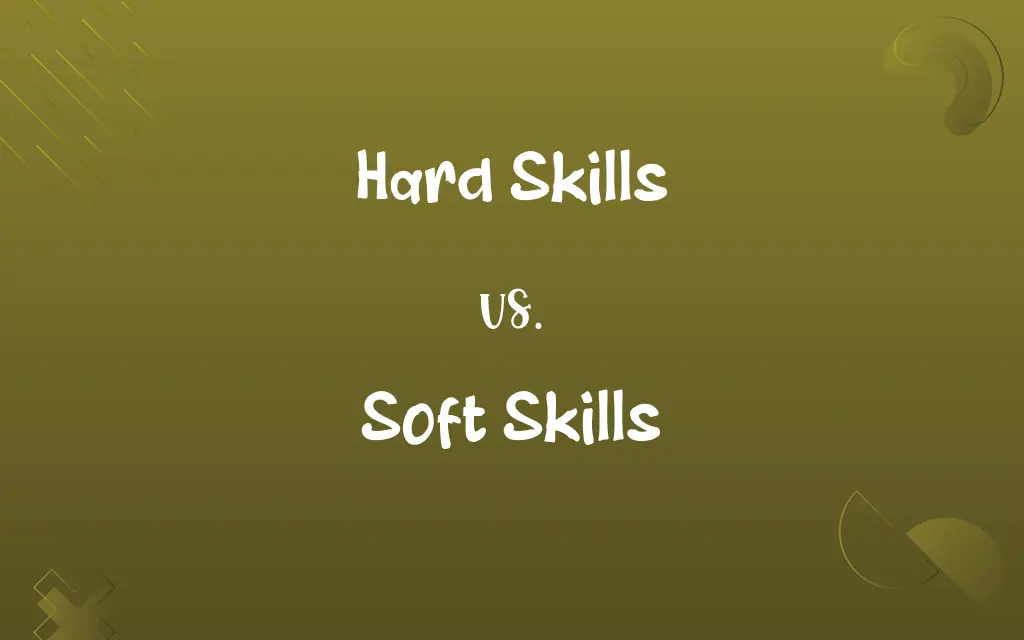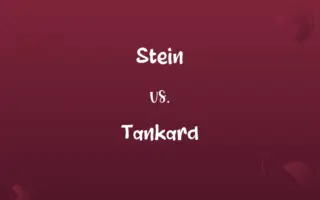Hard Skills vs. Soft Skills: Know the Difference

By Shumaila Saeed || Published on January 28, 2024
Hard Skills are specific, teachable abilities or skill sets, like coding or accounting; Soft Skills are personal attributes and interpersonal skills, like communication or teamwork.

Key Differences
Hard Skills refer to specific, teachable, and measurable abilities such as programming, financial analysis, or machine operation. They are often acquired through formal education and training, and are essential for performing specific job tasks. Soft Skills, in contrast, are interpersonal and people-oriented skills like communication, leadership, and empathy. They are less tangible and harder to quantify but are crucial for collaborating effectively in a workplace.
Shumaila Saeed
Jan 28, 2024
Employers value Hard Skills for their direct application to specific job duties. For instance, a software developer must have programming skills. These skills are often listed in job descriptions and are the basis for technical proficiency. Soft Skills, however, are equally important as they determine how well a person interacts with others. They include emotional intelligence, adaptability, and problem-solving, and are key to building relationships and navigating workplace dynamics.
Shumaila Saeed
Jan 28, 2024
The acquisition of Hard Skills typically involves structured training, certification, and education. They are often industry-specific and are easily demonstrated through tests or practical assignments. Soft Skills, on the other hand, are generally developed over time and through experience. They are often honed through personal interaction, feedback, and reflection, and are more about one's personality and attitude.
Shumaila Saeed
Jan 28, 2024
In career development, Hard Skills might get you hired, as they are often the qualifications employers look for in candidates. However, Soft Skills are what lead to long-term success, facilitating teamwork, problem-solving, and adaptability in changing environments. They help in managing conflicts, inspiring teams, and leading projects.
Shumaila Saeed
Jan 28, 2024
Hard Skills are usually included in a resume or CV under education and specific job skills. They are concrete and easily verifiable. Soft Skills, however, are often demonstrated in cover letters, interviews, and references. They are about how you work and interact with others, making them essential for workplace harmony and efficiency.
Shumaila Saeed
Jan 28, 2024
ADVERTISEMENT
Comparison Chart
Nature
Technical, measurable, specific
Interpersonal, intangible, people-oriented
Shumaila Saeed
Jan 28, 2024
How They Are Learned
Formal education, training, practice
Experience, observation, feedback
Shumaila Saeed
Jan 28, 2024
Examples
Coding, machinery operation, foreign language proficiency
Communication, teamwork, leadership
Shumaila Saeed
Jan 28, 2024
Role in Employment
Often required for job eligibility
Essential for teamwork, leadership, and adaptability
Shumaila Saeed
Jan 28, 2024
Assessment
Through tests, certifications, and practical demonstrations
Through observations, interactions, and feedback
Shumaila Saeed
Jan 28, 2024
ADVERTISEMENT
Hard Skills and Soft Skills Definitions
Hard Skills
Abilities that can be clearly demonstrated and evaluated.
Her graphic design skills were evident in the brochure she designed.
Shumaila Saeed
Jan 05, 2024
Soft Skills
Abilities that involve managing people and relationships.
His conflict resolution skills defused many workplace disagreements.
Shumaila Saeed
Jan 05, 2024
Hard Skills
Learned, measurable abilities required for specific tasks.
Her proficiency in Excel was evident from the complex spreadsheets she created.
Shumaila Saeed
Jan 05, 2024
Soft Skills
Personal attributes that enable effective teamwork and communication.
Her communication skills were key in team project success.
Shumaila Saeed
Jan 05, 2024
Hard Skills
Job-specific skills that can be quantified.
Her fluency in three languages made her an asset in international negotiations.
Shumaila Saeed
Jan 05, 2024
ADVERTISEMENT
Soft Skills
Skills related to emotional intelligence and leadership.
His leadership skills were evident when he led the project to success.
Shumaila Saeed
Jan 05, 2024
Hard Skills
Practical skills that apply directly to a job role.
His coding skills were critical in developing the new software.
Shumaila Saeed
Jan 05, 2024
Soft Skills
Non-technical skills that relate to how you work and interact with others.
Her adaptability was crucial during the company's restructuring.
Shumaila Saeed
Jan 05, 2024
Hard Skills
Technical skills acquired through education or training.
His carpentry skills were essential in constructing the cabin.
Shumaila Saeed
Jan 05, 2024
Soft Skills
Interpersonal skills that enhance interaction and job performance.
His empathy made him excellent at resolving customer complaints.
Shumaila Saeed
Jan 05, 2024
Repeatedly Asked Queries
Can Hard Skills be easily learned?
Yes, through structured education, training, and practice.
Shumaila Saeed
Jan 28, 2024
What are Hard Skills?
Specific, teachable abilities or skill sets, often acquired through formal training.
Shumaila Saeed
Jan 28, 2024
How important are Hard Skills in a job?
Very, as they are essential for performing specific job tasks.
Shumaila Saeed
Jan 28, 2024
What are Soft Skills?
Personal attributes and interpersonal skills that determine how we interact with others.
Shumaila Saeed
Jan 28, 2024
How do you demonstrate Soft Skills?
Through interactions, behavior, and observed in various situations.
Shumaila Saeed
Jan 28, 2024
How do Soft Skills affect teamwork?
They facilitate collaboration, communication, and conflict resolution.
Shumaila Saeed
Jan 28, 2024
What role do Soft Skills play in career success?
They are crucial for effective communication, teamwork, and leadership.
Shumaila Saeed
Jan 28, 2024
Do employers value Hard Skills or Soft Skills more?
Both are highly valued; Hard Skills often get you hired, Soft Skills help you succeed.
Shumaila Saeed
Jan 28, 2024
Are Soft Skills natural or learned?
They can be innate but are often developed through experience and interaction.
Shumaila Saeed
Jan 28, 2024
Can you test for Hard Skills?
Yes, through practical assignments, exams, or certifications.
Shumaila Saeed
Jan 28, 2024
Should Hard Skills be listed on a resume?
Yes, as specific skills or certifications.
Shumaila Saeed
Jan 28, 2024
Can Soft Skills be improved?
Yes, through feedback, reflection, and practice.
Shumaila Saeed
Jan 28, 2024
Can Hard Skills become outdated?
Yes, especially with technological advancements and industry changes.
Shumaila Saeed
Jan 28, 2024
Can you have too many Hard Skills?
While versatility is good, overemphasis on Hard Skills can overshadow the need for Soft Skills.
Shumaila Saeed
Jan 28, 2024
Are Hard Skills industry-specific?
Often, as they are directly related to specific job roles.
Shumaila Saeed
Jan 28, 2024
How do Soft Skills impact remote work?
They're critical for communication, self-management, and virtual collaboration.
Shumaila Saeed
Jan 28, 2024
How can Soft Skills be highlighted during an interview?
Through examples of past experiences and how you handled various situations.
Shumaila Saeed
Jan 28, 2024
Are Soft Skills more important in leadership roles?
Yes, as they involve managing teams, inspiring others, and decision-making.
Shumaila Saeed
Jan 28, 2024
Is it easier to learn Hard Skills or Soft Skills?
It varies by individual; Hard Skills are more structured, while Soft Skills are more nuanced.
Shumaila Saeed
Jan 28, 2024
Do Hard Skills have more impact at the start of a career?
Typically, yes, as they are crucial for entry-level job qualifications.
Shumaila Saeed
Jan 28, 2024
Share this page
Link for your blog / website
HTML
Link to share via messenger
About Author
Written by
Shumaila SaeedShumaila Saeed, an expert content creator with 6 years of experience, specializes in distilling complex topics into easily digestible comparisons, shining a light on the nuances that both inform and educate readers with clarity and accuracy.








































































